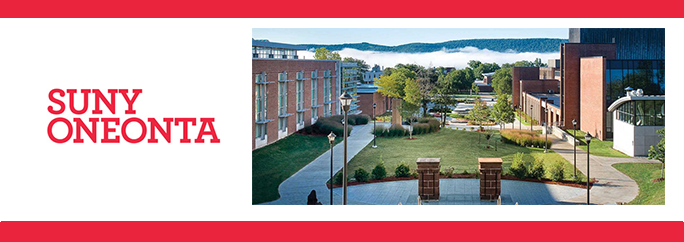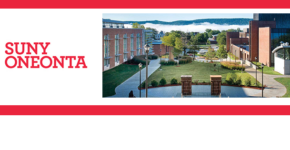
The Academic Minute from 05.16 – 05.20
Monday, May 16th
Casey Coomes – SUNY Oneonta
Songbirds and Climate Change
Casey Coomes is a recent graduate of the Department of Ecology and Evolutionary Biology at the University of Tennessee Knoxville. Her research examines the effects of heat stress on animal behavior. Specifically, Dr. Coomes focuses on communication and mate choice in songbirds. Her dissertation research explores how rising temperatures affect male song and female mate choice in zebra finches. While at Tulane University, where she was a PhD student, Coomes designed and led workshops for an event called Girls in STEM at Tulane (GiST), a program for middle school girls in New Orleans. In their workshop “Thermal Image-ination,” she taught about scientific concepts such as climate change and thermoregulation.
Tuesday, May 17th
Dan Stich – SUNY Oneonta
Could We Bring Back Lost Species of Fish?
Dan Stich joined the Oneonta faculty in 2015 after earning a B.T. in fisheries and aquaculture at the State University of New York Cobleskill College of Agriculture and Technology, an M.S. in fish and wildlife conservation at the Virginia Polytechnic Institute and State University, and a PhD in wildlife ecology at the University of Maine. He previously worked with NOAA Fisheries as a contracted fishery biologist studying effects of dam passage performance standards and lake connectivity on shad and herring in the Northeast and continues to collaborate with federal agencies on related issues. He currently teaches courses in general biology and Lake management. Dr. Stich uses data-driven approaches to answer questions about a wide range of species and topics that range in breadth from physiology of individual organisms to population-level responses to management actions. These approaches make use of modern quantitative and computer-based modeling techniques to address complex problems faced by both local and regional resource managers and are extensively supplemented by field and laboratory research. Dr. Stich is a certified lake manager (CLM).
Wednesday, May 18th
Florian Reyda – SUNY Oneonta
Parasites Revisited
Dr. Florian Reyda is a professor of biology at the State University of New York College at Oneonta. He specifically is a parasitologist—someone who focuses on parasites. Dr. Reyda and his students conduct research on parasites of fishes in New York and elsewhere. During some of their recent fish parasite survey work Reyda and his students have found evidence of parasites disappearing from their natural systems from where they were previously found. Reyda and his family have been in New York since 2008. He and his wife Laura Reyda run a rain forest conversation organization, with educational and medical outreach activities based out of a property in the rain forest of Manu, Peru.
Thursday, May 19th
Kate McGrath – SUNY Oneonta
Facial Asymmetry in Gorillas Can Be A Sign of Stress
Kate McGrath studies indicators of stress preserved in the skulls and teeth of great apes. She has done fieldwork in Rwanda, Kenya, and Tanzania at fossil sites and in national parks. Dr. McGrath studied anthropology and geology as an undergrad at the College of Charleston, and from 2011-2012, she worked full time as an imaging specialist at the Smithsonian’s National Museum of Natural History. She regularly engages in science outreach with kids and the public at K-12 schools and museums. She uses blogging, social media, and public outreach to make science more inclusive and accessible.
Friday, May 20th
Kiyoko Yokota – SUNY Oneonta
Why You Should Still Care About Microplastics
Kiyoko Yokota is an Associate Professor of Biology at State University of New York College at Oneonta (SUNY Oneonta) and conducts research at SUNY Oneonta Biological Field Station (BFS) in Cooperstown, NY, on the shore of Otsego Lake. In collaboration with the BFS Volunteer Dive Team and Otsego Lake Association, she operates the NSF-funded Otsego Lake data buoy that collects high-frequency water quality data and contributes to regional and global lake science research projects through the Global Lake Ecological Observatory Network. She teaches undergraduate and master’s courses in general biology, ecology, limnology, and lake management, including a short-term study abroad program to Ogasawara Islands, Japan. Yokota earned a BA in biology with ecology emphasis from Saint Cloud State University and a Ph.D. in ecology, evolution and behavior from the University of Minnesota – Twin Cities. She is a certified lake manager (CLM) of North American Lake Management Society (NALMS) and currently serves as the NALMS President-Elect. Yokota’s research interests include lake and phytoplankton ecology, aquatic microplastic pollution, and harmful cyanobacterial blooms, and she enjoys working with various local and regional lake and conservation-related organizations.
